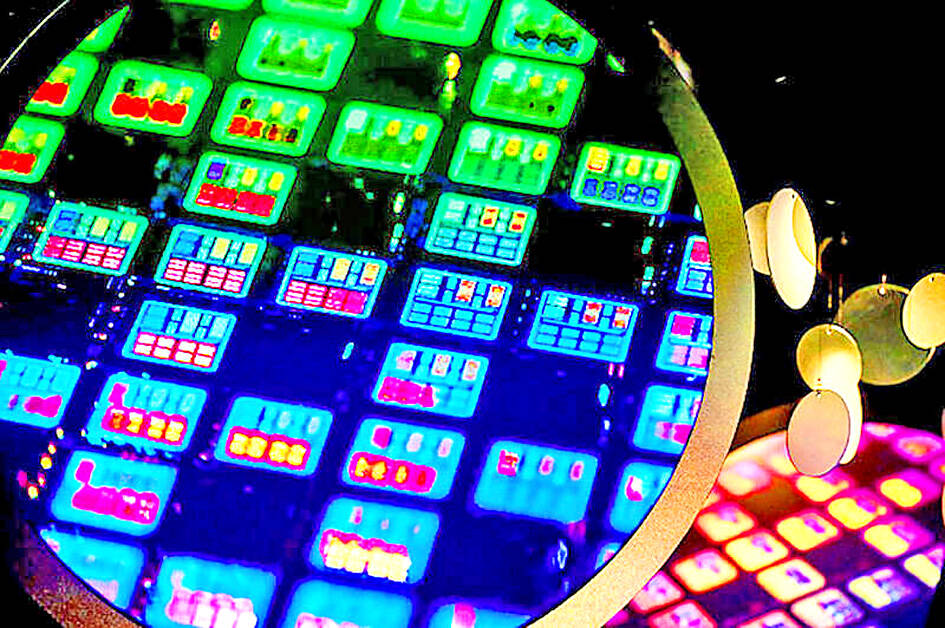The Executive Yuan’s economic diplomacy task force has approved programs aimed at bolstering the nation’s chip diplomacy with Japan and European nations.
The task force in its first meeting had its operational mechanism and organizational structure confirmed, with Premier Cho Jung-tai (卓榮泰) the convener, and Vice Premier Cheng Li-chiun (鄭麗君) and Minister Without Portfolio Ma Yung-cheng (馬永成) the deputy conveners.
Minister of Foreign Affairs Lin Chia-lung (林佳龍) would be the convener of the task force’s strategy group in charge of policy planning for economic diplomacy.

Photo: Bloomberg
The meeting was attended by the heads of the National Development Council, the Ministry of Economic Affairs, the Ministry of Foreign Affairs, and the National Science and Technology Council.
A source, who asked to remain anonymous, yesterday cited Cho as saying at the meeting that the economics ministry should give the foreign ministry data and documents about Taiwan-Japan collaborations on semiconductors, which would be managed as projects to deepen bilateral political and economic ties.
Minister of Economic Affairs J.W. Kuo (郭智輝) last week at a news conference said that Taiwan is cooperating with Japan’s semiconductor supply chain.
In the first or second quarter this year, state-supported service companies would be set up in Fukuoka Prefecture, while agreements would be signed to protect Taiwanese firms building plants in an industrial park in Kumamoto Prefecture, he said.
The source also cited Cho as saying that the task force would take over the Central and Eastern Europe Resilience Program 2.0, with the foreign ministry assisting the economic ministry to propose projects.
In Germany, the semiconductor sector would be developed around Taiwan Semiconductor Manufacturing Co’s (台積電) plant, and extend to Poland and the Czech Republic to form a triangular industrial cluster, they said.
In the Philippines, the government is planning to aid the local semiconductor sector by investing in infrastructure and power grid construction in Luzon as the developable land area is large, the source said.
Taiwan and Thailand’s collaboration on a Smart City Program was also mentioned in the meeting, they said.
Taiwan has made significant breakthroughs in its relationship with Thailand, such as a new agreement on investment promotion and protection signed in June last year, and Thailand’s approval of indefinite visa-free entry for Taiwanese travelers, the source said.
The task force plans to combine Taiwan’s economic and industrial competitive edges to deepen the nation’s ties with like-minded nations and those that share the same strategic benefits, with the goal of enhancing Taiwan’s participation in the Indo-Pacific region and international community, and achieving President William Lai’s (賴清德) policy of value diplomacy and his vision of Taiwan being one of the world’s economic strongholds, they said.

TRAGEDY STRIKES TAIPEI: The suspect died after falling off a building after he threw smoke grenades into Taipei Main Station and went on a killing spree in Zhongshan A 27-year-old suspect allegedly threw smoke grenades in Taipei Main Station and then proceeded to Zhongshan MRT Station in a random killing spree that resulted in the death of the suspect and two other civilians, and seven injured, including one in critical condition, as of press time last night. The suspect, identified as a man surnamed Chang Wen (張文), allegedly began the attack at Taipei Main Station, the Taipei Fire Department said, adding that it received a report at 5:24pm that smoke grenades had been thrown in the station. One man in his 50s was rushed to hospital after a cardiac arrest

SAFETY FIRST: Double the number of police were deployed at the Taipei Marathon, while other cities released plans to bolster public event safety Authorities across Taiwan have stepped up security measures ahead of Christmas and New Year events, following a knife and smoke bomb attack in Taipei on Friday that left four people dead and 11 injured. In a bid to prevent potential copycat incidents, police deployments have been expanded for large gatherings, transport hubs, and other crowded public spaces, according to official statements from police and city authorities. Taipei Mayor Chiang Wan-an (蔣萬安) said the city has “comprehensively raised security readiness” in crowded areas, increased police deployments with armed officers, and intensified patrols during weekends and nighttime hours. For large-scale events, security checkpoints and explosives

A car bomb killed a senior Russian general in southern Moscow yesterday morning, the latest high-profile army figure to be blown up in a blast that came just hours after Russian and Ukrainian delegates held separate talks in Miami on a plan to end the war. Kyiv has not commented on the incident, but Russian investigators said they were probing whether the blast was “linked” to “Ukrainian special forces.” The attack was similar to other assassinations of generals and pro-war figures that have either been claimed, or are widely believed to have been orchestrated, by Ukraine. Russian Lieutenant General Fanil Sarvarov, 56, head

PUBLIC SAFETY: The premier said that security would be tightened in transport hubs, while President Lai commended the public for their bravery The government is to deploy more police, including rapid response units, in crowded public areas to ensure a swift response to any threats, President William Lai (賴清德) said yesterday after a knife attack killed three people and injured 11 in Taipei the previous day. Lai made the remarks following a briefing by the National Police Agency on the progress of the investigation, saying that the attack underscored the importance of cooperation in public security between the central and local governments. The attack unfolded in the early evening on Friday around Taipei Main Station’s M7 exit and later near the Taipei MRT’s Zhongshan